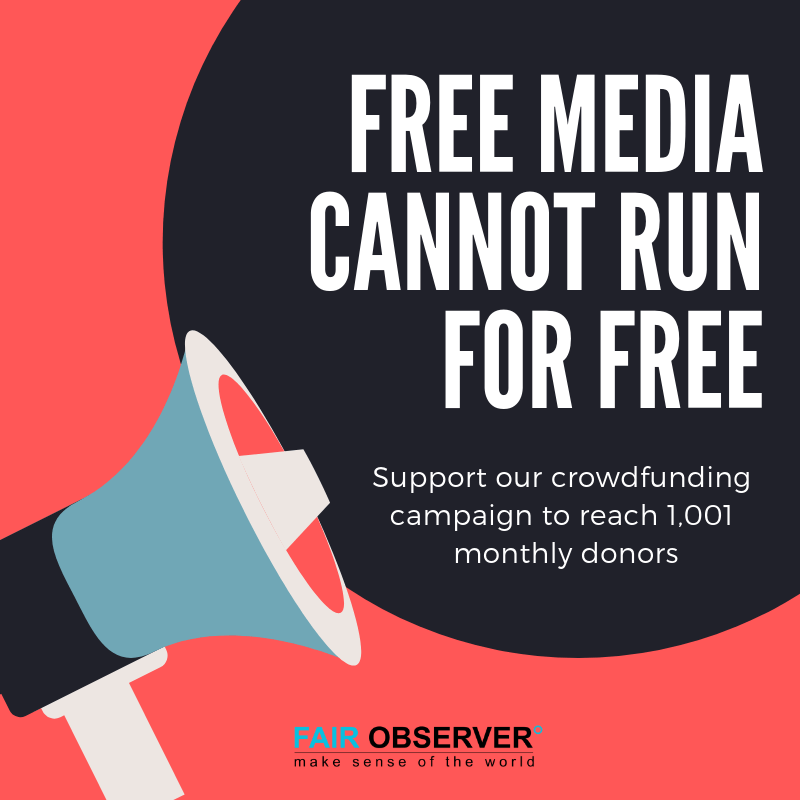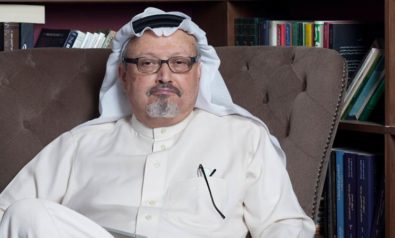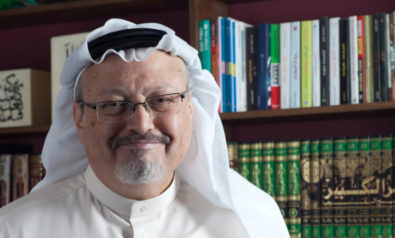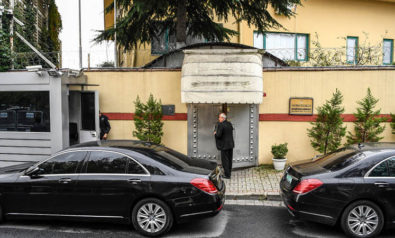With funding cuts that have hit cultural sectors, some museums, galleries and universities are accepting money from politically unsavory donors.
In the wake of journalist Jamal Khashoggi’s death, Western governments are re-evaluating their links with Saudi Arabia. German Chancellor Angela Merkel has suspended arms sales to the kingdom, while the US is mulling sanctions over what President Donald Trump described as the “worst cover-up in history.”
Yet amid all the high-level political maneuvering, the arts sector has found itself, somewhat surprisingly, at the center of the backlash. Museums and galleries in London and New York have come under fire for their decision to accept Saudi money, the latest example of the murky relationship between money and high culture.
Art has been a centerpiece of Saudi Arabia’s attempts to expand its ties with the West under its bombastic young leader Mohammed bin Salman. The crown prince himself launched the Misk Art Institute in 2017, with a pledge to create “Saudi Arabia’s leading platform for grassroots cultural production, diplomacy and exchange.” Activists described it as little more than “window-dressing,” designed to hide the kingdom’s unseemly repression behind a veil of high-minded liberalism.
Despite these concerns, the art world embraced the new institute. In 2018, Misk secured Saudi Arabia’s first-ever space at the Venice Bienniale, one of the world’s most influential visual art exhibitions.
Even more remarkably, several of New York’s most famous galleries agreed to participate in the Misk-backed Arab Art and Education Initiative (AAEI), which purports “to build greater understanding between the United States and the Arab world.” The galleries have scheduled a network of events, the largest of which is the Brooklyn Museum’s exhibition, “Syria, Then and Now: Stories from Refugees a Century Apart,” which opened earlier this month and is set to run until January. The Elizabeth Foundation for the Arts, Columbia University and the Metropolitan Museum of Art are all hosting their own autumnal events, ranging from explorations of the Arab avant-garde to symposia on Islamic culture.
Now, the New York art world has washed its hands of Riyadh. The Met and Brooklyn museums have both rejected Misk’s funding for their Middle East programs, while Colombia has postponed a talk by renowned Saudi artist Ahmed Mater, one of the institute’s leading figures, until a time “more conducive to the academic dialogue.”
Yet this blackballing only came after a period of very public procrastination. For days, the Met and Brooklyn museums maintained a wait-and-see approach amid fierce media scrutiny, only severing ties when evidence of foul play became overwhelming and politicians had begun to talk about sanctions.
In London, the Natural History Museum faced similar scrutiny over a reception for the Saudi Embassy on October 11. Writing in The Guardian, British columnist Owen Jones called for a protest outside the event, saying the fact that the museum is “hosting an evening of celebration for one of the most extreme regimes on Earth while Yemeni children starve to death is beneath contempt.” Even though Jones’ column helped attract a major demonstration, the Natural History Museum chose to go ahead with the event, describing Saudi Arabia as an “important source of external funding.”
 While it’s easy to condemn the Western arts community for its tardiness in condemning Riyadh, its stance simply reflects the fact that, for cultural organizations, principles can be an expensive luxury. Wealthy, powerful and politically unsavory individuals have long used museums, galleries and academic bodies to boost their own image, and the scale of their patronage makes it extremely difficult to cut the cord.
While it’s easy to condemn the Western arts community for its tardiness in condemning Riyadh, its stance simply reflects the fact that, for cultural organizations, principles can be an expensive luxury. Wealthy, powerful and politically unsavory individuals have long used museums, galleries and academic bodies to boost their own image, and the scale of their patronage makes it extremely difficult to cut the cord.
Sackler and South Africa
A case in point is the Sackler scandal, which erupted almost 12 months ago with articles alleging that the billionaire dynasty had fueled the world’s opioid crisis by marketing highly addictive painkillers. Like the Khashoggi affair, the reports sparked outrage in both London and New York, given the Sackler family’s huge investment in the two cities’ cultural communities. One British columnist even described the Sacklers as “world-class drug pushers” and likened them to “cocaine kingpin Pablo Escobar.”
Yet, despite the toxic publicity, arts bosses on both sides of the Atlantic have been reluctant to turn their backs on Sackler. Given the family is reported to have invested £80 million in the British arts scene alone, it’s easy to understand why.
A similar dilemma has befallen universities in South Africa and the UK over their ties to imperial magnate Cecil Rhodes, whose tenure as governor of Cape Colony in the late 19th century is seen by critics as a precursor to apartheid. A student-led campaign entitled “Rhodes Must Fall,” which erupted in 2015 over a statue in Cape Town, grew into a wider protest centering on Oxford University, which runs a scholarship program bequeathed by, and named after, Rhodes. Although many students argued that the program — intended for students born in the former British Empire — should be reassessed or renamed, others suggested it should focus on the cultural impact of Rhodes’ money, and not its dubious origins. Three years on from the initial protests, the program (and the statue of Rhodes at his former Oxford college) remains untouched.
It’s certainly fair to ask why such institutions, which are supposed to promote fair-minded, progressive values, appear so willing to endorse those who reject them. But given the funding cuts that have hit the cultural sectors in both Britain and America, those charged with running today’s museums, galleries and universities may argue they have no other choice but to accept these donors — and stand by them when their money suddenly gets dirty.
The views expressed in this article are the author’s own and do not necessarily reflect Fair Observer’s editorial policy.
Support Fair Observer
We rely on your support for our independence, diversity and quality.
For more than 10 years, Fair Observer has been free, fair and independent. No billionaire owns us, no advertisers control us. We are a reader-supported nonprofit. Unlike many other publications, we keep our content free for readers regardless of where they live or whether they can afford to pay. We have no paywalls and no ads.
In the post-truth era of fake news, echo chambers and filter bubbles, we publish a plurality of perspectives from around the world. Anyone can publish with us, but everyone goes through a rigorous editorial process. So, you get fact-checked, well-reasoned content instead of noise.
We publish 2,500+ voices from 90+ countries. We also conduct education and training programs
on subjects ranging from digital media and journalism to writing and critical thinking. This
doesn’t come cheap. Servers, editors, trainers and web developers cost
money.
Please consider supporting us on a regular basis as a recurring donor or a
sustaining member.
Will you support FO’s journalism?
We rely on your support for our independence, diversity and quality.
















